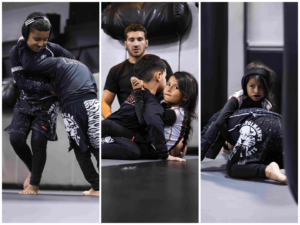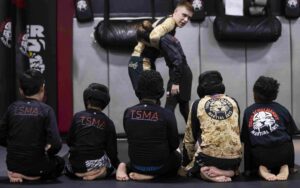Last Updated on September 5, 2024.
When it comes to extracurricular activities for their kids, parents often look for something that provides both physical exercise and valuable life skills. Martial arts classes tick all the right boxes, offering numerous benefits. Let’s explore why martial arts, specifically Jiu-Jitsu, can be one of the best choices for your child.
Why Martial Arts Classes Are Good for Kids
Physical Fitness and Health
In today’s digital age, it’s crucial to keep kids active. Martial arts provide an excellent way to ensure your child gets the physical exercise they need. Through meticulously structured training, children improve their strength, flexibility, and overall fitness. Unlike traditional sports, martial arts focus on holistic body movement, promoting better coordination and balance.
Mental Toughness and Discipline
Martial arts instill a sense of discipline that transcends the dojo. Kids learn to set goals, practice patience, and persevere through challenges. The structured environment of Jiu-Jitsu classes helps children develop a routine, teaching them the importance of consistency and hard work.
Emotional and Social Development
Jiu Jitsu classes are a fantastic way for children to develop emotional intelligence and social skills. They learn to manage their emotions, handle stress, and build resilience. The camaraderie in martial arts fosters teamwork and respect for others, helping kids form healthy, supportive relationships.
Self-Defense Skills
One of the most practical benefits of martial arts is self-defense. Knowing how to protect oneself can boost a child’s confidence and provide peace of mind for parents. Jiu-Jitsu teaches kids to avoid conflicts and defend themselves effectively without resorting to violence.
Why Is Jiu-Jitsu Good for Kids?
The Unique Benefits of Jiu-Jitsu for Kids
Among the various martial arts, Jiu-Jitsu stands out as an exceptional choice for kids. Jiu-Jitsu focuses on ground fighting and grappling, emphasizing technique over brute strength. This makes it particularly suitable for children, as it teaches them that skill and strategy can overcome size and strength.
Building Confidence and Self-Esteem
Jiu-Jitsu classes for kids are designed to build confidence and self-esteem. As children master new techniques and progress through the ranks, they gain a sense of accomplishment and self-assurance. This newfound confidence often translates into other areas of their lives, such as school and social interactions.
Promoting Respect and Focus
Jiu-Jitsu places a strong emphasis on respect—for instructors, peers, and oneself. Kids learn to listen attentively, follow instructions, and show courtesy. These values are reinforced through the practice of Jiu-Jitsu, helping children develop a respectful and focused mindset.
Starting Jiu-Jitsu at a Young Age
Kids can start Jiu-Jitsu classes as early as age 4, with many schools offering specialized programs for the youngest students. These classes are carefully designed to match the developmental stages of young children, ensuring that activities are age-appropriate and safe. Instructors use playful, engaging methods to teach fundamental skills, emphasizing fun and learning in a supportive environment. Safety is a top priority, with a strong focus on non-violent techniques and controlled movements. Rest assured, your child will be in a nurturing setting where their physical and emotional well-being is paramount, allowing them to thrive as they begin their martial arts journey.
Jiu-Jitsu Classes for Younger Kids
Fun and Engaging for Ages 5-7
For children ages 5-7, Jiu-Jitsu classes are tailored to be fun and engaging. These classes incorporate playful drills and activities that keep young kids entertained while teaching them the fundamentals of Jiu-Jitsu and self-defense. The focus is on building agility, flexibility, and coordination in a joyful environment.
Essential Skills for Young Minds
Through Jiu-Jitsu, young children learn essential skills such as discipline, focus, and respect. These foundational lessons are crucial for their overall development and set the stage for future learning and growth.
Jiu-Jitsu Classes for Older Kids
Building Confidence and Self-Esteem for Ages 8-12
As children grow older, Jiu-Jitsu classes become more structured and goal-oriented. For kids ages 8-12, the focus shifts to building confidence and self-esteem through more advanced techniques and training. Certified instructors guide students in setting and achieving personal goals, both on and off the mat.
Emphasizing Self-Defense Without Violence
Older children benefit from learning effective self-defense techniques that do not rely on violence. BJJ teaches kids how to neutralize threats and protect themselves without causing harm to others. This approach aligns with the core values of respect and non-aggression.
Life Skills Through Jiu-Jitsu
Discipline and Goal Setting
One of the standout benefits of Jiu-Jitsu is its ability to teach discipline and goal setting. Children learn to set realistic, achievable goals and work diligently to reach them. This process fosters a sense of responsibility and accomplishment, encouraging kids to apply these skills in other areas of their lives.
Focus and Concentration
Jiu-Jitsu requires a high level of focus and concentration. Kids must pay close attention to their instructors and practice techniques with precision. This intense focus helps improve their concentration skills, which can be beneficial in academic settings and daily activities.
Respect and Teamwork
Respect and teamwork are integral parts of Jiu-Jitsu training. Children learn to respect their instructors, training partners, and themselves. They also develop a sense of camaraderie with their peers, working together to improve and succeed. These values help shape well-rounded individuals who can collaborate effectively with others.
Choosing the Right Jiu-Jitsu School
Finding a Qualified Instructor
When selecting a Jiu-Jitsu school for your child, it’s important to find a qualified instructor with experience in teaching children. A good instructor will create a positive, supportive environment that encourages learning and growth.
Assessing the School Environment
Visit different schools and observe the classes to get a sense of the environment. Look for clean, well-maintained facilities and a welcoming atmosphere. The school should promote a culture of respect and inclusivity.
Considering Class Structure and Schedule
Choose a school with a class structure and schedule that fits your child’s needs and your family’s routine. Consistency is key to progress in Jiu-Jitsu, so make sure the classes are convenient and accessible.
Conclusion: The Journey of Jiu-Jitsu
Enrolling your child in Jiu-Jitsu at Tiger Schulmann’s can be a life-changing decision. The physical, mental, and emotional benefits of this martial art are profound, helping children develop into confident, disciplined, and respectful individuals. By choosing Tiger Schulmann’s Jiu-Jitsu, you’re providing your child with the tools they need to succeed both on and off the mat. So, why wait? Let the journey of Jiu-Jitsu begin!


